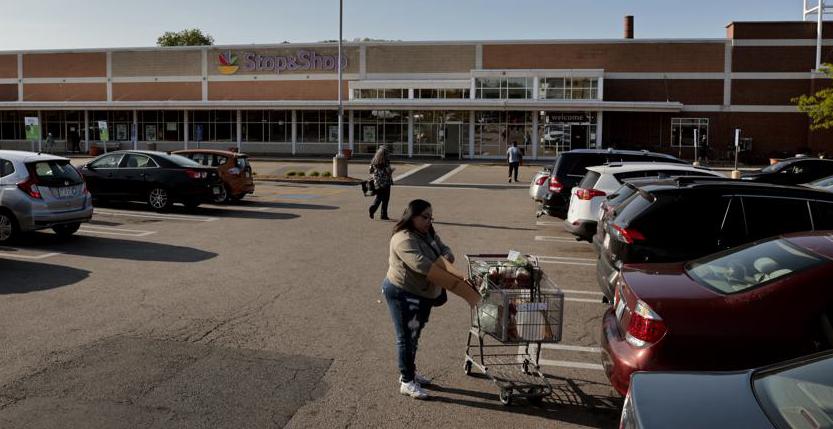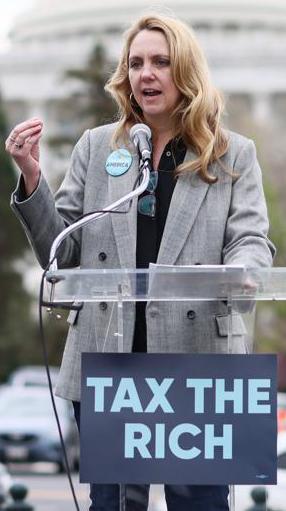
The youth organizers of Hyde Square Task Force are claiming success, once again.
Nearly two years after releasing a grass-roots study on pricing differences at Boston-area Stop & Shop locations, in which the students found a grocery cart of items at their nearby Jackson Square store cost $34 more than a list of similar products in the more affluent Dedham, the prices at both stores are now roughly equal.
During an April shopping trip to both stores, with the same shopping list they first used in 2023, the students found prices for most of the items purchased in Jackson Square and Dedham are now nearly identical. In fact, the 2-pound packs of Bubba’s frozen turkey and beef burgers in Dedham were both listed at slightly higher prices.
Stop & Shop hasn’t said that the price drops are a result of the students’ study, and has instead attributed them to a long-term plan to lower prices and reinvent the stores. But the students say any adjustment for customers who live in lower-income neighborhoods such as the one in Jamaica Plain is still a victory.
“Just the change that they’ve made already is going to bring thousands of dollars back into families’ pockets in the area,’’ said Emmanuel Vargas, a Hyde Square Task Force youth organizer and Dearborn STEM Academy junior. “That is already a massive win.’’
Though thankful for the changes made by the grocery giant in their neighborhood store, the youth organizers are pressing on. The prices at Stop & Shop’s Jamaica Plain and Dedham locations are virtually the same, according to the students’ data, but customers at stores in Dorchester’s South Bay shopping plaza, Grove Hall, and Mission Hill — all lower-income neighborhoods — are still paying more. The median income for the Census tracts encompassing the South Bay, Grove Hall, and Mission Hill shops are roughly $92,000, $45,000, and $66,000, respectively. Meanwhile, the typical household living in the Census tract of the Dedham store makes roughly $140,000.
“I feel for those in other low-income neighborhoods who aren’t getting the same treatment,’’ said Danny Vargas, a Living Safely in Jackson Square youth organizer for Hyde Square Task Force. (There’s no relation to Emmanuel Vargas.) The Bunker Hill Community College student said the changes are especially crucial during the current economic downturn, when “just maybe a couple of cents more would either make it or break it.’’
Members of the Massachusetts Congressional delegation are adding to the pressure. In a letter sent last week to Frans Muller, president and CEO of Ahold Delhaize, which owns the Quincy-based grocery chain, US Senators Elizabeth Warren and Ed Markey, and US Representatives Jim McGovern and Ayanna Pressley suggested Stop & Shop “continues to profit at the expense of lower-income communities in Massachusetts by charging them higher prices for groceries.’’
“It’s no coincidence that working-class communities are getting stuck with sky-high prices,’’ Warren said in a separate statement. “We’re keeping up the pressure to make sure Stop & Shop isn’t over-charging families for the food they work hard to put on the table.’’
Since the study two years ago, Stop & Shop stood by its pricing. But it has called the youth’s study “misleading,“ and criticized the methodology for not including sale items into its analysis and for using only a fraction of its thousands of grocery items for comparison. The grocery chain has also maintained that it does not factor a neighborhood’s socioeconomic status into its pricing algorithms, and said it instead weighs a mixture of factors including commercial rent prices, labor costs, and store size.
Stop & Shop did not provide specific comments on the note or the teens’ research last week, “given that we just received the letter from Senator Warren’s office and the latest research from the Hyde Square Task Force — and have not had time to fully review.’’
However, the chain doubled down on its promise to bring down grocery prices in Massachusetts locations, and said it “will continue to invest in our stores and in our communities,’’ pointing to its School Food Pantry Program as an example.
“Stop & Shop remains committed to lowering prices across all of our stores in Massachusetts – and that work, which is already underway, will continue throughout 2025,’’ the company said in a statement.
In their letter, the Congressional delegation posed a list of questions to Stop & Shop with a May 14 deadline, asking for information on why stores in low-income communities appear to be charging higher prices; how the company is executing its multi-year strategy to lower grocery prices; and a separate question on what factors the corporation considered in determining to close eight Massachusetts stores last year.
The motive behind the questions, Pressley said in a statement, was in large part the several studies the teens had conducted.
“That which gets measured gets done, and thanks to the intrepid work of young organizers at the Hyde Square Task Force, we have the receipts,’’ Pressley said.
The questions build on a letter the Massachusetts delegation, led by Warren, sent to Muller last September in response to the Hyde Square Task Force‘s continuous studies. The lawmakers requested information on Stop & Shop’s pricing algorithms and use of consumer data.
In a December response obtained by the Globe, Stop & Shop President Roger Wheeler said the store has been able to lower prices on thousands of items in stores across New England, including at its Jackson Square location, as part of a structural review of all of its stores. The multi-year strategy, he wrote, is a “multifaceted, large-scale effort that we are implementing market-by-market.’’
The grocer has also closed underperforming stores, pumped millions into remodeling, and moved its digital coupon system on-site.
In the letter, Wheeler declined to answer questions on the store’s pricing and consumer data practices, writing that such info “is highly confidential and competitively sensitive, and if disclosed, could result in competitive harm to our business.’’
Nevertheless, the Hyde Square Task Force organizers say they recognize that higher prices cause harm to lower-income communities, largely because they’ve felt the difference the changes in their local store has had on their wallets.
Danny Vargas, the Bunker Hill student, lives behind the Jackson Square store and feels the impact directly. The store has been remodeled, and the prices have changed. “I don’t have to travel so far just to get that little discount,’’ he said.
He wants other Boston families in neighborhoods with similar socioeconomic makeup to feel the difference.
Tiana Woodard can be reached at tiana.woodard@globe.com.


